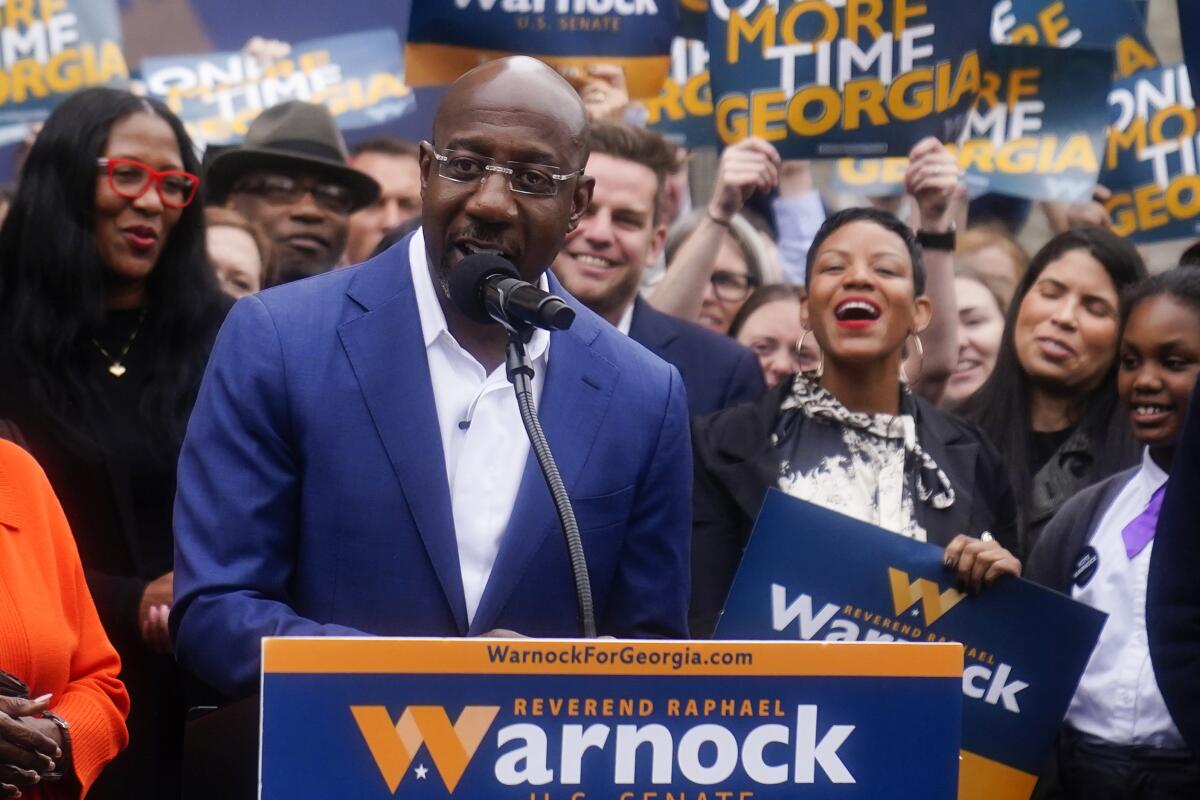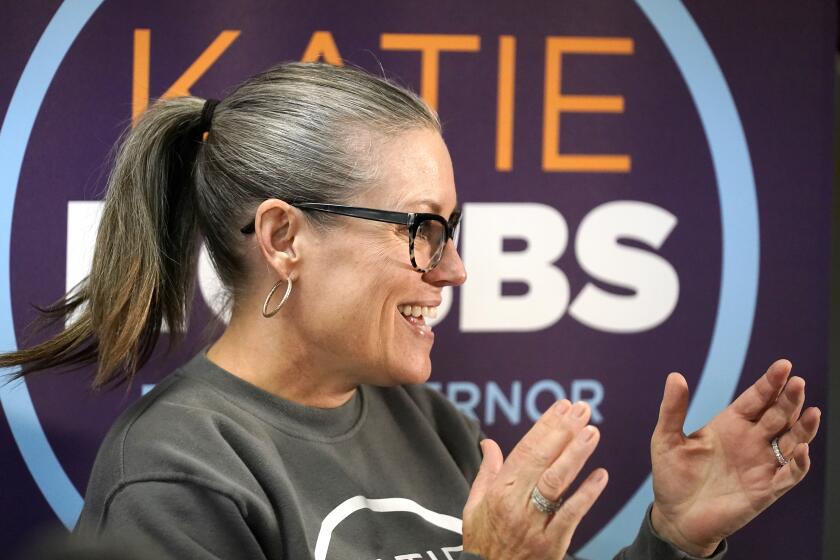Georgia runoff: Why one Senate seat is crucial for Democrats

- Share via
WASHINGTON — Democrats have secured their majority in the Senate for the next two years. But holding on to Democratic Sen. Raphael Warnock’s seat in Georgia’s runoff next month could be crucial to their success.
If Warnock wins the runoff against Republican Herschel Walker, Democrats will have 51 seats. That would make legislating a lot easier than it is in the current 50-50 Senate, the narrowest possible balance of power. For the last two years, Democrats have had to rely on Vice President Kamala Harris — she is the president of the Senate — to break ties.

Republicans and Democrats are spending millions of dollars to win the seat in the Dec. 6 runoff in Georgia after neither Warnock nor Walker, a famed former football player, won the necessary 50% margin to triumph on election day. Warnock beat Sen. Kelly Loeffler in a 2020 special election and is now vying for a full six-year term.
A 50-50 Senate “slows everything down,” Senate Majority Leader Charles E. Schumer said in a recent interview. “So it makes a big difference to us.”
A look at what a 51st seat would mean for Senate Democrats:
Outright majority
A 51-49 Senate would give Democrats an outright majority, meaning that Schumer wouldn’t have to negotiate a power-sharing agreement with Republican leader Mitch McConnell. The two parties had to do that two years ago and also in 2001, the last time the Senate was evenly split.
In early 2021, confirmations of President Biden’s nominees were stalled for several weeks while Schumer and McConnell worked out an agreement on how to split committees and move legislation on the Senate floor. Using the little leverage he had, McConnell threatened not to finalize a deal until Democrats promised that they wouldn’t try to kill the legislative filibuster that forces a 60-vote threshold.
The Republican leader finally relented after two Democratic senators — West Virginia’s Joe Manchin III and Arizona’s Kyrsten Sinema — made it clear they would not support such a move on the filibuster.
Committee balance
Committees are now evenly split between the two parties due to the 50-50 power-sharing deal. This often creates extra steps when a committee vote is tied, forcing Democrats to hold votes on the Senate floor to move ahead with bills or nominees.
Should they win an outright 51-seat majority, Democrats would likely hold an extra seat on every committee, making it much easier to move nominees or legislation on party-line votes.
Biden, a longtime senator before becoming president, acknowledged this reality after Democrats clinched 50 seats and the Senate majority.
“It’s always better with 51, because we’re in a situation where you don’t have to have an even makeup of the committees,” Biden said. “And so that’s why it’s important, mostly. But it’s just simply better. The bigger the numbers, the better.”
The Joe Manchin problem
The extra seat would also give Democrats the ability to pass bills while losing one vote within their caucus — a luxury they haven’t had over the last two years. Manchin, a moderate from conservative West Virginia, often used the narrow margin to his advantage, forcing Democrats to bend to his will on several pieces of legislation.
Manchin’s opposition to Biden’s sweeping health, climate and economic package stalled it for months, until Schumer negotiated a narrower version with the West Virginia senator. In the end, several of Biden’s legislative priorities were left out.
That pressure could be even more acute in the next Congress, as Manchin and Sinema, a fellow moderate, are both up for reelection and will want to prove their bipartisan credentials.
Get our L.A. Times Politics newsletter
The latest news, analysis and insights from our politics team.
You may occasionally receive promotional content from the Los Angeles Times.
Confirming judges
With Republicans taking charge of the House majority next year, Democrats won’t have much of a chance to pass major legislation. So one of Schumer’s main priorities will be confirming judges nominated by Biden in the last two years of his term.
A rules change under former Senate Majority Leader Harry Reid (D-Nev.) a decade ago allowed the Senate to pass judges with only a simple majority, or 51 votes. Winning Warnock’s seat would make that process easier and more expedient.
“We’ve been able to achieve a lot, but we can do even more with an additional senator,” said Illinois Sen. Richard J. Durbin, the No. 2 Democrat in the chamber and the chairman of the Senate Judiciary Committee.
Free Kamala Harris
The vice president has already broken 26 tied votes as vice president — twice as many as Mike Pence did in his four years in the job. Biden never broke a tie in his eight years as vice president.
The need to break tie votes requires Harris to keep close to Washington. A 51st vote would free up the vice president somewhat, allowing her to be out of town when the Senate is holding important votes.
In a speech earlier this year, Harris noted that she had broken President John Adams’ record of casting the most tie-breaking votes in a single term.
“I think we should all fully appreciate how history can take a turn,” Harris said.
More to Read
Get the L.A. Times Politics newsletter
Deeply reported insights into legislation, politics and policy from Sacramento, Washington and beyond. In your inbox three times per week.
You may occasionally receive promotional content from the Los Angeles Times.










